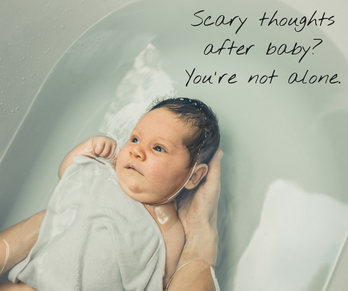 “How did they let me leave the hospital with this brand-new baby? How will I keep him alive?” This is a common refrain voiced by new parents in the first few days after their baby is born. After all, there’s a steep learning curve to feeding and diapering a newborn, getting enough sleep and adjusting to a new normal. Unfortunately, a large number of new parents (mothers and fathers) also experience intense anxiety that something bad will happen to their baby. We just don’t talk about it. Disturbing thoughts don’t mean you’re crazy. For some, this distressing fear is experienced as unwanted images or thoughts. They’re scary, uncontrollable and feel like they’re playing on a loop in the parent’s mind. The thoughts are disturbing and can include someone — maybe even the parents themselves -- harming the baby. Parents I see at the Swedish Center for Perinatal Bonding & Support sometimes share these scary thoughts with me. Their first questions are, “I would never do anything to hurt my baby! Why am I thinking these things?” and “Am I going crazy?” In fact, these thoughts are symptoms of anxiety, depression or obsessive compulsive disorder, which can occur during and after pregnancy. By themselves, these thoughts don’t mean a parent will do anything to harm a baby. Maternity-related anxiety is common and treatable Talking about intrusive thoughts, anxiety and depression is hard. Women feel ashamed and worried that if they disclose their symptoms, someone’s going to take their baby away or think they aren’t good mothers. While postpartum depression has received media attention, ongoing silence around intrusive thoughts contributes to ongoing stigma and feelings of isolation for new parents. Nearly 1 in 5 women and 1 in 10 men experience depression or anxiety after the birth of a baby. For many of the women, their symptoms started in pregnancy. Anyone can experience these symptoms, but factors that increase a woman’s risk include:
Comments are closed.
|
Therapy, Groups, Supervision, Consultation, Training in Seattle, WA and online in Washington state
Laurie Ganberg, LICSW, PMH-C (#LW60673320) ~ Specializing in Perinatal Mental Health, Trauma, & Fat Liberation
Now practicing through Fiddlehead Therapy, PLLC with online services and in person in Mountlake Terrace, WA
Home | Privacy | Contact | Zoom Link
© 2019-2024 All rights reserved
Laurie Ganberg, LICSW, PMH-C (#LW60673320) ~ Specializing in Perinatal Mental Health, Trauma, & Fat Liberation
Now practicing through Fiddlehead Therapy, PLLC with online services and in person in Mountlake Terrace, WA
Home | Privacy | Contact | Zoom Link
© 2019-2024 All rights reserved
